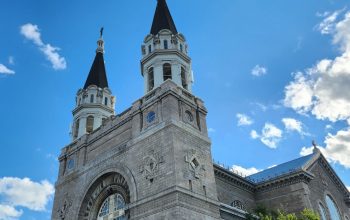A Muslim perspective on Christmas
Adel Nathani – CONTRIBUTOR
Growing up Muslim in North America has its challenges. The challenges are complex and intricate, some of them structural and some of them personal. The one challenge that most of the Muslim community has not dealt with well is the challenge of identity. Growing up in Canada as first or second generation immigrants, we face a cultural clash daily. Everything from what we learn in school, to TV shows, music, books, gender norms, and even festivities like Halloween and Christmas represent differences between Muslim culture and the general Canadian culture. As non-Muslim celebrations, Halloween and Christmas are heavily scrutinized in much of the Muslim world. As a Muslim, participating in these holidays often leads to stigmatization, not only of the individual participating but also, on occasion, of their entire extended family.
Christmas celebrates the birth of Jesus Christ, who is known in the Qur’an and Islamic faith as Isa, a prophet. However, Muslims do not celebrate Christmas and some Muslim states have gone as far as banning the celebration of Christmas. Religiously, Islam frowns upon the attribution or acknowledgement of a God other than Allah, with the Qur’an stating, “Whoever associates anything with Allah, he devises indeed a great sin” (Qur’an, 4:48). Some Muslim scholars argue that celebrating Christmas is a subconscious acknowledgement and acceptance of another religion and another divine being. This explanation makes sense throughout most religions as they all have their own set of beliefs and festivities. However, some conservative Muslim scholars go further and claim that wishing someone “Merry Christmas” or attending a company Christmas party is the same as celebrating Christmas. This is where I respectfully disagree.
I argue that Christmas has more than one meaning, especially here in the West. There is, undeniably, a religious component for those who believe and complete the religious obligations associated with Christmas. However, more than anything, the Christmas period (which I categorize as Christmas Eve, New Years Eve and New Years Day) is a celebration of life, love and unity. Christmas is a time when people come together, regardless of the differences. Now, imagine the impact this has on young Muslims growing up in Canada. Most of their peers are engaging in the festivities and celebrating, while they sit out. This creates a clear, divisive distinction between the groups and labels Muslims as “the other”. Credit must be given to Canadian society, especially the Canadian education system, where for the most part we have shifted from saying “Merry Christmas” to “Happy Holidays” in an attempt to be more inclusive. Now it is time for the Muslim community to step up. I am not advocating that we celebrate Christmas by decorating our houses and having large Christmas dinners. We do have our own beautiful traditions and celebrations to look forward to. Instead, we should respect our home (Canada) and join in with our Canadian families in their festivities. By participating in Christmas activities like ‘Secret Santa’, attending Christmas parties at work and school and participating in charity work like clothing drives or soup kitchens, we are taking a proactive step toward community building. And in the aftermath of a racially charged American election cycle, community building is more important than ever.
The issue of identity will not be solved easily, but perhaps encouraging young Muslims to participate in society, rather than shunning them from doing so, is the first step we need to take. So Merry Christmas, Happy Hanukkah, Happy New Year and see you all next semester! I end with the Muslim greeting of peace, As-Salam Alaikum – may peace be upon you.



